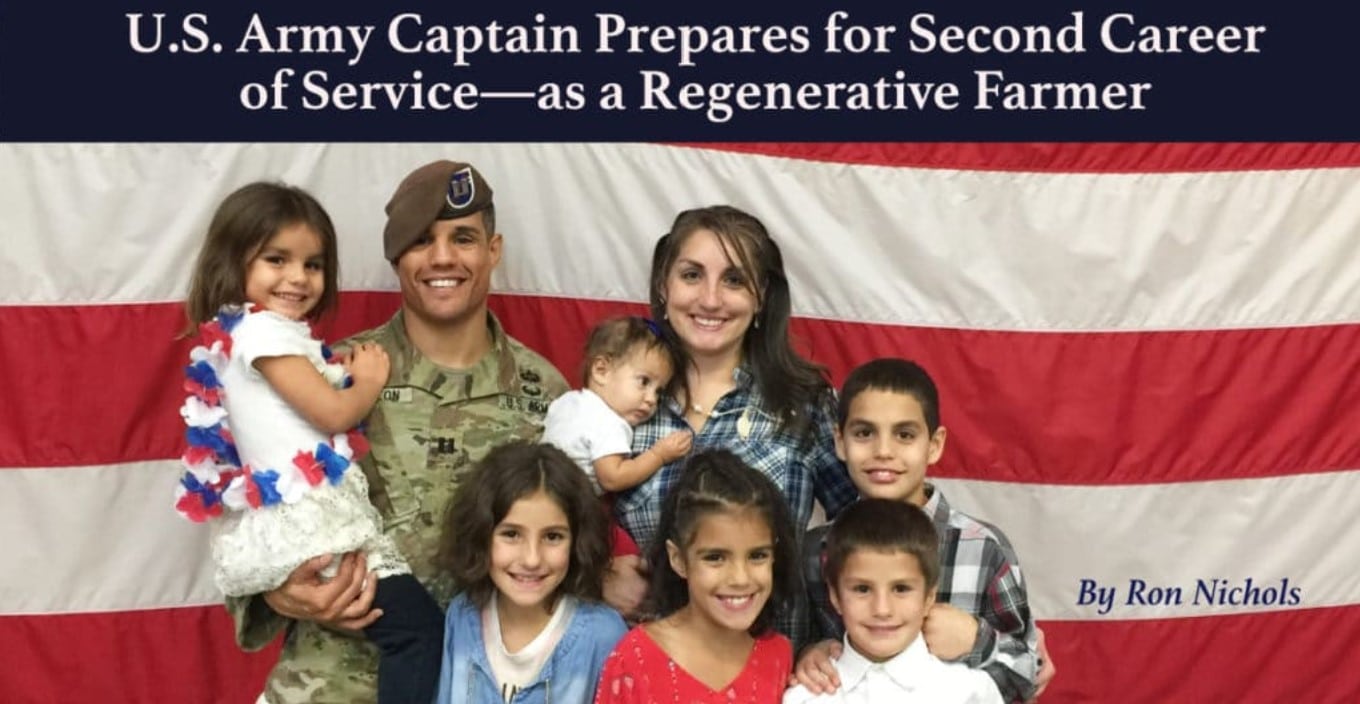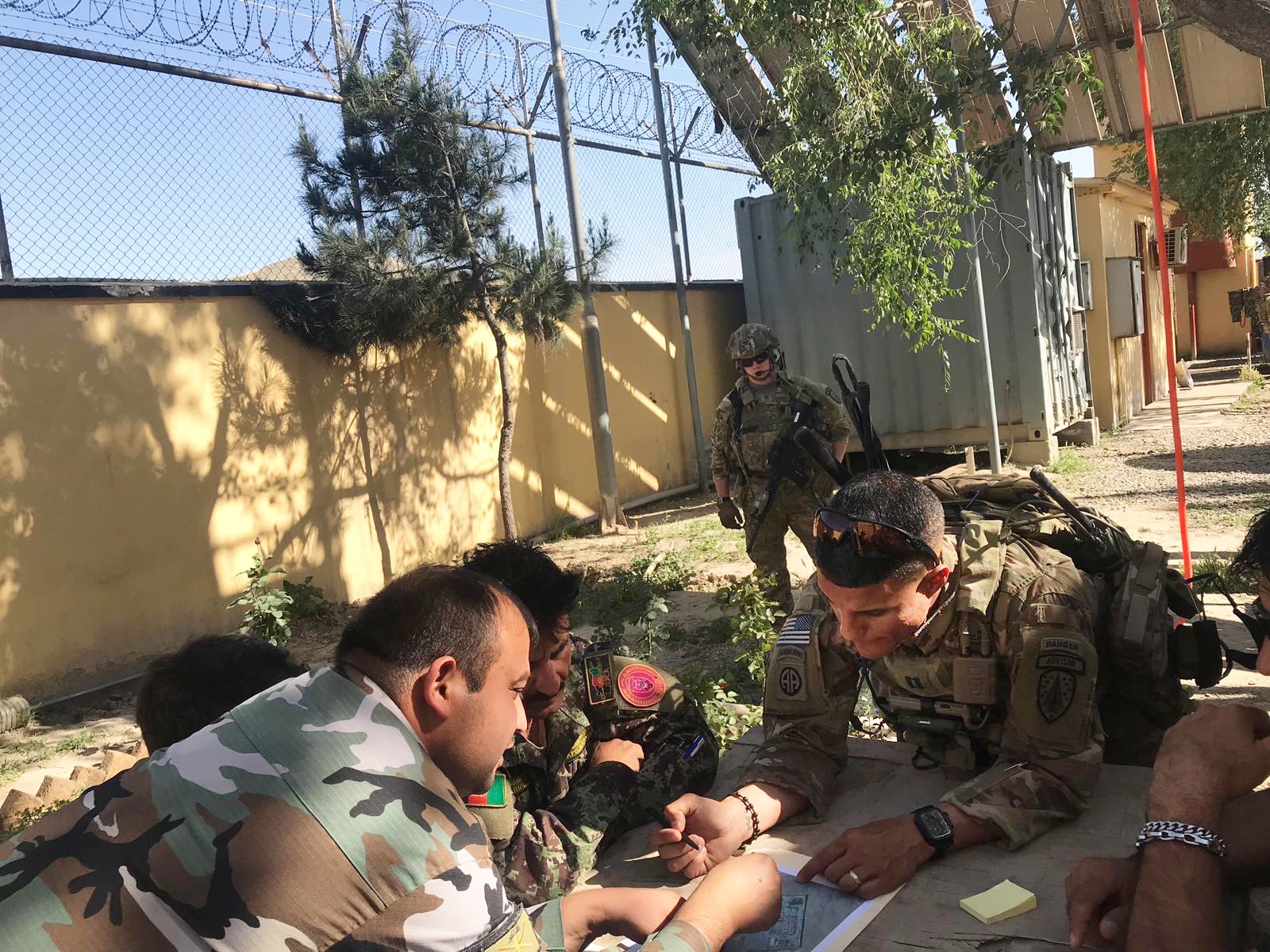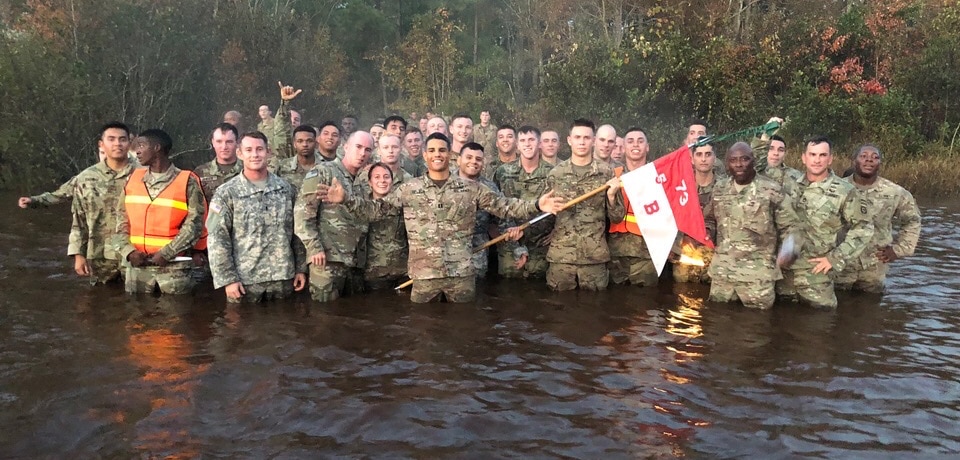
For Gilberto (Gil) De Leon, life is all about “service.” A U.S. Army Captain (promotable) with more than 17 years in military uniform, and multiple tours as a combat arms officer in Afghanistan and Iraq with the 82nd Airborne Division and Security Force Assistance Brigade, De Leon’s commitment to a life of service was strongly influenced by his father, who also had a career in uniform.
“My family’s originally from Puerto Rico, but I was born into the military,” De Leon says. “We moved all over the place and serving has been an important thing in our family.”
Now with the 4th Security Forces Assistance Brigade in Ft. Carson, Colorado, he’s preparing to transition from active duty to reserve duty within the next year—and the 37-year-old veteran and father of six has his eyes set on serving again in his next career. This time, as a regenerative farmer/rancher.
“In Iraq and Afghanistan, I saw the potential of agriculture for the people there, but I also saw how poorly managed and degraded the resources were,” he says. “I could see that the people could thrive more and be more self-sufficient if the land was managed better and I realized then that agriculture could be another way to serve my fellow Americans, provide alternative services to veterans like alternative coping methods to minimize or reduce mental illness and invisible wounds through hands-on therapy that can only come from working on a farm or ranch.”
Because the average age of U.S. farmers is 60 years old, De Leon sees regenerative agriculture as a way to address the need for new farmers when older farmers retire. “We need more regenerative small farms in every county so we can sustain and stimulate the economy for generations to come, all while minimizing the adverse health and environmental impacts of commercial farming,” he said.
The principles of regenerative agriculture involve using practices that improve soil health to restore ecosystems, increase biodiversity, improve the nutrient density of food and increase farm profitability. Regenerative agricultural practices also sequester carbon and reduce greenhouse gases by using fewer petroleum-based inputs and by optimizing photosynthetic and nutrient cycling processes.
As part of the Army’s transitioning program, De Leon recently took a 20-day sabbatical to reflect on what the next chapter in his life should be. After what he describes as “much prayer, thought, reflection and discussion” with his wife, Holly, he concluded that his skill set, work ethic and desire to continue serving, aligned perfectly with the attributes required to be a successful regenerative farmer.
“I really think that it’s my calling. I realize farming is hard work with odd hours, but it's a way of life—not like career in corporate America,” De Leon says. “I think this is it for us now, a way that we can sustain ourselves, raise our children, help our local community, our country. This is where we can really continue serving.”
He also was attracted to the regenerative agriculture movement’s “esprit de corps.”
“I just want to be part of that movement because I love being part of a team,” De Leon says. “In the military there are many cultures in a team—each contribution makes the team better. The regenerative agriculture team is growing. I want to be part of that movement and to one day say I contributed to that.”

But with no previous experience in agriculture, De Leon is leaning on his military training to help plan and achieve his overall strategic goal—through education, training, planning, execution and follow through.
“We know to attack any problem, you have to have first begin with education,” he says. “It can be informal, like having an accountability partner or somebody that's been in the business to coach you along. Since I currently live on a military post and don’t have farmland, it makes sense for me to begin educating myself through online training resources, books, workshops and available immersive training.”
Like many farmers who chose to embark upon the regenerative farming journey, De Leon’s first education step began with internet research where he discovered YouTube videos featuring Gabe Brown and other Understanding Ag instructors and regenerative farming experts.
His research also led him to subscribe to the online course, “Regen Ag 101.”
“Regen Ag 101 was a wonderful experience,” he says. “I was disappointed when it ended because it was so good. The videos were very professionally done and passionately driven. You can see the spirit and the grit of the instructors as they enthusiastically taught class. All of the data provided, and the explanation of why regenerative agriculture is so important, made it easy to see why regenerative farming provides so many more advantages compared to commercial farming.”
Still, De Leon knows that there’s only so much one can learn remotely, so he applied for and was accepted into Texas A&M’s veterans’ agricultural training program “Battleground to Breaking Ground” (BGBG). The program allows active-duty service members to pursue a different vocation to gain the necessary skills and experience prior to transitioning from the military.

According to the organization’s website, BGBG’s goals are “to enhance the sustainability and increase the number of farms and ranches in Texas and throughout the U.S., especially for military veterans.” The BGBG project is a three-phase educational program available to veterans, active-duty military, their families and beginning farmers and ranchers.
As part of the BGBG program, De Leon will complete some of his hands-on training at the BGBG Mesquite Field Farm in Nixon, Texas. And he’s looking for more training opportunities in the months preceding his transition out of the Army.
Like other new or beginning farmers, however, De Leon also faces formidable land-acquisition and start-up costs. But he has an Army-learned, pragmatic and systematic approach to that hurdle, as well.
“To be honest, it’s one of the factors that scares me and other beginning farmers the most,” he says. “But my attitude is ‘I'm not going to let the lack of capital stop me from my next vocation.’ What I learned in the military is how to plan and how to mitigate risks for a favorable outcome and that’s what I’m doing.”
With his education and networking plan already in place, De Leon’s next steps include attending an upcoming Soil Health Academy three-day grazing school and getting additional on-farm and hands-on experience. Combined with plan to acquire start-up capital through operational grants, De Leon hopes to find an appropriate farm in Texas or North Carolina shortly after leaving the Army.
“We're still doing research, trying to figure out where we want to live that's best for our family’s future,” he says. “We have a lot of family in the Carolinas and no family in Texas, but if we find the right land for the right enterprise, we're willing to go there.”
De Leon says the execution of his plan will necessarily be slow, measured and intentional.
“We’ll just start small with one enterprise so we can fully understand the system, including the business side and it upscale slowly within time to minimize risk,” he says. “I realize it’s going to take time. I also understand the importance of marketing and advertising and I'm pretty strong at that.”
Even while he transitions to his new career, De Leon hopes his evolving story will serve and inspire other beginning farmers.

“Hopefully, if anybody reads my story, I want them to understand that fear is a real thing,” he says, “but you have to embrace it and attack it like anything else. To be honest, I'm afraid because most of my life has been spent in the military and I'm about to do something completely different. But taking the Regen Ag 101 course and learning from others has helped me reduce that anxiety and fear.”
Deployed overseas during much of the past 17 years, De Leon believes having his own regenerative farm will allow him to make up for lost time with his family and to establish a way of life and service that reflects his Christian values. “I hope one day to host transition service members myself, to train them in their next vocation as future regenerative farmers and agricultural leaders,” he says. “Importantly, I want to teach my kids what it means to be good stewards of our land and animals by raising them in an environment that allows for physical, mental and spiritual growth. I think through regenerative farming and ranching, I can accomplish all those things.
By Ron Nichols
